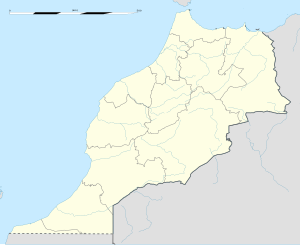| Revision as of 13:50, 9 January 2025 editM.Bitton (talk | contribs)Extended confirmed users54,614 edits Reverted 1 edit by Based Anwar (talk): Per MOS:INFOBOXFLAGTags: Twinkle Undo← Previous edit | Revision as of 13:52, 9 January 2025 edit undoBased Anwar (talk | contribs)49 editsmNo edit summaryTags: Reverted Visual edit Mobile edit Mobile web edit Disambiguation links addedNext edit → | ||
| Line 23: | Line 23: | ||
| | map_label = Battle of Tadla | | map_label = Battle of Tadla | ||
| | map_caption = Location of the Battle of Tadla | | map_caption = Location of the Battle of Tadla | ||
| | territory = * The end of ] rule in Morocco. | |||
| * The ] took control of ] and its province ensuring complete control of ]. | |||
| * The ] were expelled from ]. | |||
| }} | }} | ||
| The '''Battle of Tadla''' occurred in September 1554 in ], ], between ], last ruler of the ], and ], ruler of the ]. | The '''Battle of Tadla''' occurred in September 1554 in ], ], between ], last ruler of the ], and ], ruler of the ]. | ||
Revision as of 13:52, 9 January 2025
Battle in 1554| Battle of Tadla | |||||||||
|---|---|---|---|---|---|---|---|---|---|
| Part of Conflicts between the Regency of Algiers and Morocco | |||||||||
| |||||||||
| Belligerents | |||||||||
| Wattasid Dynasty | Saadi Dynasty | ||||||||
| Commanders and leaders | |||||||||
| Ali Abu Hassun † | Muhammad al-Shaykh | ||||||||
| Strength | |||||||||
| Unknown | Unknown | ||||||||
| Casualties and losses | |||||||||
| Unknown | Unknown | ||||||||
 | |||||||||
| Conflicts between the Regency of Algiers and Morocco | |
|---|---|
The Battle of Tadla occurred in September 1554 in Tadla, Morocco, between Ali Abu Hassun, last ruler of the Wattasid dynasty, and Mohammed ash-Sheikh, ruler of the Saadis.
Background
In 1545 the Wattasid ruler in northern Morocco, Abu Hassun, submitted to the Ottoman sultan and declared himself an Ottoman vassal, but the Ottomans were unable to intervene when the Wattasids lost Fez to their southern Saadian rivals under Mohammed ash-Sheikh. Ali Abu Hassun fled to neighbouring Algiers, where he was offered asylum.
Ali Abu Hassun was able with the help of the Ottomans under Salah Rais to reconquer Fes in 1554. Ali Abu-Hassun was put in place as Sultan of Fez and a vassal of the Ottomans supported by the Janissaries and an Algerian army. Ali Abu Hassun soon paid off the Algerian troops, and gave them the base of Peñon de Velez, which the Moroccans had reconquered from Spain in 1522. Upon withdrawal, Salah Reis assured the Saadi ruler that he would grant his enemy Ali Abu Hassun no further assistance.
Battle
Ali Abu Hassun was vanquished and killed by the Saadians at the Battle of Tadla in September 1554 thus bringing an end to the Wattasid dynasty.
Following the battle, Mohammed ash-Sheik was able to enter the city of Fez on 13 September 1554, and became the undisputed ruler of Morocco, establishing the Saadian dynasty as the sole ruler of the country.
Aftermath
The Ottomans reacted by having Mohammed ash-Sheik killed in 1557 by an assassin named Sahil, who brandished an axe and decapitated the Saadi ruler. An attempt to invade the country ensued the following year in the Battle of Wadi al-Laban.
Notes
- ^ Abun-Nasr, Jamil M. (1987). A History of the Maghrib in the Islamic Period. Cambridge University Press. pp. 154–155. ISBN 978-0-521-33767-0.
- Smith, Richard Lee (2006). Ahmad Al-Mansur: Islamic Visionary. Pearson Longman. p. 11. ISBN 978-0-321-25044-5.
- ^ Kissling, H. J.; Spuler, Bertold; Barbour, N.; Trimingham, J. S.; Braun, H.; Hartel, H. (1969). The Last Great Muslim Empires. Brill. p. 103. ISBN 978-90-04-02104-4.
- The Present State of the Empire of Morocco. Its Animals, Products, Climate, Soil, Cities, Ports, Provinces, Coins, Weights, and Measures. With the Language, Religion, Laws, Manners, Customs, and Character, of the Moors; the History of the Dynasties Since Edris; the Naval Force and Commerce of Morocco; and the Character, Conduct, and Views, Political and Commercial, of the Reigning Emperor. Translated from the French of M. Chenier. Vol. 1. , Volume 2
- Ogot, Bethwell A.; Africa, Unesco International Scientific Committee for the Drafting of a General History of (1 January 1992). Africa from the Sixteenth to the Eighteenth Century. UNESCO. p. 201. ISBN 978-92-3-101711-7.
Categories: